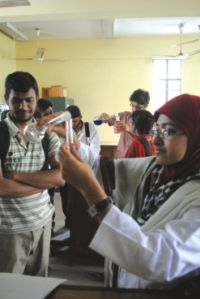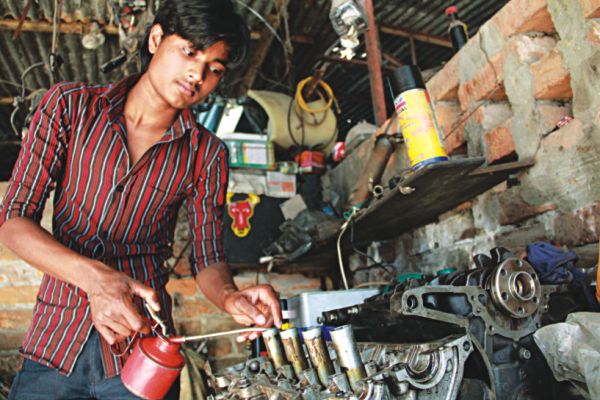| Spotlight

Rakibul Hasan
Photos: Md Ata Islam Khan Mojlish
What do you want to be when you grow up? Almost everyone is asked this question. For kids, the answer to this question may seem relatively easy as some would like to be the ice-cream vendor who appears on the streets on sleepy afternoons with boxes full of delicacies, or to be a brave sailor who regularly embarks on adventurous voyages and digs out treasures from the other end of the world. However as one grows older and gets to know the world, the person develops a fascination for more practical career goals, influenced by certain factors such as personal choice, expectations from parents, job prospects and so on. As a student, the steps to achieve the cherished goals begin at school, as in Bangladesh it is during the secondary level of education that most of the students have to choose their future line of study (whether it would be science, humanities or business studies). In the context of Bangladesh, where tertiary education has become almost compulsory to make a career, which ensures a decent living, it is expected that students in university choose majors that best suit their future career goals. Nevertheless in Bangladesh, despite having a university degree, students often find the situation quite bleak to make a career in the particular field of study in which they have achieved their higher education. As a result, students today are confused about the applicability of the university discipline they are studying have graduated in, the prospects for future employment, economic wellbeing and so on.

Only a handful of subjects, namely Business or Accountancy, interest most employers in the country.
| |
 |
| |
According to tradition, students choose to study Science, Arts and
Commerce at a very early age. |
Such confusions are evident, as students after graduating from certain specialised university disciplines, like that of science, social science and humanities, are being compelled to move into professions which do not correspond to their respective field of study. As a result, students are failing to utilise their true potentials, which they developed through their hard earned higher education. “It seems that no matter what university discipline you have graduated from, one has to have a business degree such as BBA and MBA to get a good job, as niche jobs related to the education of certain disciplines and sub disciplines of science, social science and humanities are very few in number, plus the study materials and teaching process in classrooms are often not updated enough so they have little application in practical fields,” says Sabbir Ahmed, a masters student, Bangladesh University of Textiles.
The major functions of a university include not only tutoring its students but also creating new knowledge and discoveries. The research opportunities provided by most of the universities in Bangladesh are simply not enough. “Had there been enough research opportunities or scope for employment in our country, university educated students would not need to move abroad or to jobs irrelevant to their university majors in such a huge number. The fund provided by the university authority for the students who are doing their PhDs, M.Phil or research work is very meagre in amount which hardly cover the costs to conduct quality research. Moreover the number of research- based organisations which can provide the students with necessary structure to conduct research and articulate their discoveries are inadequate and students often do not get any chance to work with these acclaimed organisations, because of their fastidious perceptions toward fresh university graduates.” says Dr Md Mizanur Rahman, Associate Professor, Department of Biotechnology and Genetic Engineering, Islamic University, Kushtia. However he also adds that, “Though some people would like to think the issue of leaving home for abroad in search of better research and career opportunities as 'brain drain,' I do not consider the matter too harshly, because I believe since the students are being deprived of a favourable condition for researching here in their home country, they better move abroad for new opportunities, and as the information technology has made it easy to share knowledge worldwide, these students can contribute in their homeland through their scientific discoveries even from abroad.”

The application process for foreign universities may seem time-consuming and frustrating for many students.
Though every public and private university in Bangladesh is comprised of a host of academic departments which impart specialised knowledge on certain academic disciplines, through four-year honours and one-year masters, due to problems like scarcity of jobs in both public and private sectors, politically-affiliated appointments and nepotism, students are often being deprived of jobs which demand expertise from their respective field of education. Mustainur Rahman, a student from Department of International Relations, University of Dhaka, says, “As the study of international relations primarily deals with issues like security, diplomacy and international negotiations, I have always dreamt of contributing to the process of foreign policy decision-making in my country. Unfortunately in our country the policy-making level is heavily dependent on bureaucracy and appointments in diplomatic jobs are often politically motivated so it has become incredibly difficult for general students to make any significant contribution in the field of International Relations."
| |
 |
| |
Opportunities for research in most of the Bangladeshi universities are limited. Courtesy:Sarwar Zobair Ratul |
Many students complain that in spite of doing their graduation and post-graduation with majors which demand longer hours of study and lots of lab work, they fail to get a respectable job because either related fields have not been developed yet or because of the lack of knowledge of employers about the scope of certain academic disciplines. Surovi Alam, who is currently working in an IT firm but has completed her masters in Clinical Pharmacy, says, “Though I chose to study in Clinical Pharmacy, ignoring my parents' advice since I thought there would be plenty of job opportunities for me in the developing pharmaceutical industry of the country, the real situation was quite different. There was hardly any opportunity to do intensive research or doing an internship with one of the pharmaceutical companies, and I found that pharmacists in Bangladesh still lie in a position which is subservient to the doctors.”
So, how to properly use the potential of the huge numbers of students graduating from universities every year? Gazi Salauddin Siddiquee, a lecturer from Agrani Schools and College, Dhaka, says, “We have major problems in our overall education system. In our country, students despite completing their secondary and higher secondary levels of education, hardly develop any practical knowledge to apply in productive activities. The curriculum followed in educational institutions, whether it is a school, college or a university, is too bookish in nature and does not involve any practical skills. I think instead of producing so many university graduates, we should focus on vocational education and training in schools which would let the students grow as potential manpower and would secure their economic independence as they will be eligible to directly apply their skills to productive fields of labour and can earn a good deal both at home and abroad. University education should be preserved for those who desire to achieve an in-depth knowledge on certain subjects and want to solve a particular problem or to increase the theoretical body related to their respective field of study through intensive research work.”

There is a need to increase the number of institutions for vocational training.
The applicability and effectiveness of university degrees to prepare students for future employment have been facing a big question all over the world as we can see that students even in developed countries are standing out with protest movements such as 'Occupy Wall Street' through which students are expressing their frustration against large firms and the government at being deprived of employment opportunities even after attaining a hard earned university degree. Analysing the dilemma, including the price of higher education degrees and potential for future employment, it appears it is high time that the applicability of higher education is reconsidered and the education process in general is made more practical rather than merely theoretical and pedantic.

Classes at the educational institutions need to be more practical and interactive.
Courtesy: Raffles Institute of higher studies
|
